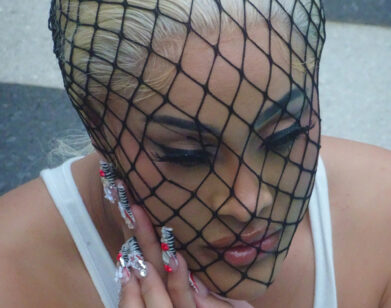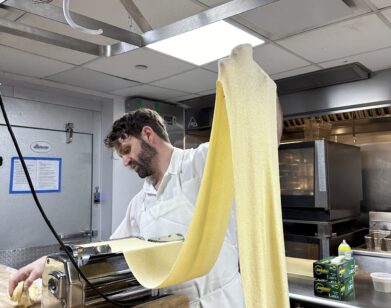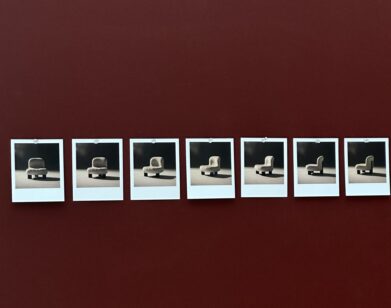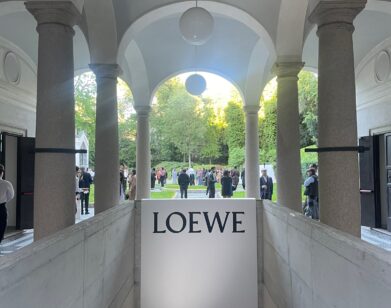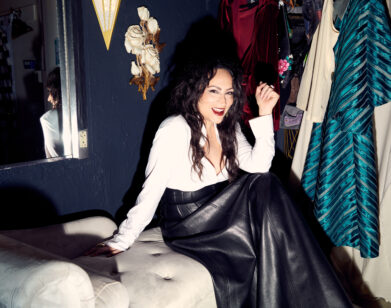Cecilia Corrigan
CECILIA CORRIGAN IN NEW YORK, APRIL 2015. PHOTOS: CHRISTIAN HÖGSTEDT. STYLING: KATIE BURNETT. MAKEUP: NAM VO FOR EXCLUSIVE ARTISTS MANAGEMENT USING LAURA MERCIER. HAIR: QUENTON BARNETTE AT ORLO SALON USING ORLANDO PITA’S ABSOLUTE SMOOTH SERUM AND REJUVENATING ARGAN OIL. STYLING ASSISTANT: LAUREN PIVEN.
Appearing sometimes as a poet, sometimes as a performer, and sometimes as a stand-up comedian, Cecilia Corrigan plays women who are more and less herself. When she reads from Titanic (2014), her debut book of logorrheic poems, the range of her intellect—and her academic, conceptual training—is so fully on display that it’s embarrassing, and she reflexively adopts a basic, girlish affect. When she performs one of her solo routines, which are carefully scripted to feel loose and unpredictable, and which are often devised ad hoc for one-off nights at experimental art spaces, the 28-year-old New Yorker makes a mess of femininity, peeling off and putting on clothes to shift—what is the opposite of seamlessly? Seamfully?—between tropes lifted from Marilyn Monroe films and Kristen Wiig sketches on SNL, to skits by the Marx Brothers and episodes of Buffy the Vampire Slayer. Her median persona is a wry, bubbly, blonde dipsomaniac; the kind of broad who’s stayed away from reality ever since she heard it was sobering.
Cecilia and I talked across my kitchen table, then across a Google Doc. She was preparing for a late-April performance of “Cecilia Corrigan’s Secret Garden,” the second of two shows commissioned from her by the New York Performance Artists Collective and staged at the Whynot Jazz Room. Now, she’s preparing for a night of “Speculative Fantasia” on June 26 at the New Museum, where she’ll read alongside Ben Coonley, Leopold Brant, Alice Sola Kim, Gazr, and Elysia Crampton. She’s also working on a number of longer-term projects, including a novel about an anorexic teenage girl who accidentally survives an apocalypse.
SARAH NICOLE PRICKETT: First of all, for those of us who haven’t seen it, can you do a little rundown of your revue? A preview of your revue, so to speak.
CECILIA CORRIGAN: This is going to come out after the show’s over, so I can spoil it, right? The show will start out as a chat show, hosted by a kind of Ab Fab-meets-Julia Childs-meets-Dr. Ruth character, who’s obviously me. Macy Rodman is her daughter, who’s just out of rehab. The show is about, you know, the dangers of allergies. It’s about flowers, little bunnies, melting icicles, dewy raindrops, and fresh looks. It’s about crisp cuts and sexual rubbing, and it’s about discovering your body, airing things out, and exploring new parts of herself.
PRICKETT: What’s the hottest new part of yourself for the Spring/Summer 2015 season?
CORRIGAN: The chest. Definitely the chest.
PRICKETT: Is cleavage is making a comeback? Because, if you ask a fashion girl, nobody’s worn a bra in years.
CORRIGAN: I don’t know the trends, but I have started wearing chicken cutlets in my performances. I was thinking about how Marilyn Monroe wore her body like it was a padded suit, and that’s what gave her such a weird, floating kind of sexual presence. In the photo shoot today for this interview I had to take off all my underwear, and I was standing in this boyish frame, and—
PRICKETT: Wait, you’re nude in the shoot?
CORRIGAN: No no, I’m wearing clothes. I just took off my bra. But underneath the photos… there’s an endless story.
PRICKETT: [laughs] I was just about to say that.
CORRIGAN: That’s a very true line. Shakira knew.
PRICKETT: How does it go? Something like, “Blah blah blah, here’s a man, he’s what she gets ‘for being a good girl.'”
CORRIGAN: It’s the story of the man she chose, and, I think it’s her territory.
PRICKETT: It’s a powerful song. And now we can talk about Orphan Black, because on Orphan Black, my favorite clone is Helena—the one they call “that Shakira-haired lookalike.”
CORRIGAN: Ugh, Orphan Black. Which episode are you on?
PRICKETT: I’m on the seventh episode of the second season, which is remarkable considering that I started watching the show about four days ago.
CORRIGAN: I watched two seasons of Orphan Black in—I want to say 11, 12, but it was probably 10 days. I’ve never had a serious chemical addiction, besides the normal dependencies one gets in this society, whatever, and so I’ve never had this experience with anything other than TV. When I wasn’t watching Orphan Black, no matter what I was doing, I was thinking, “Fuck, I wish I was watching Orphan Black right now.”
PRICKETT: Which is your favorite clone?
CORRIGAN: I do love Helena, because she’s so feral, but she’s also a tender creature. If I had to fuck one of the clones, it would definitely be Helena. She also plays a mystical kind of role. She’s like Faith on Buffy. Buffy is my Bible. When Faith turns good and teams up with Buffy, it’s so much more rewarding than when any other character is good, because Faith has more reasons to be bad. Only her pure goodness of heart makes her good.
Another thing that interests me about Orphan Black is that Tatiana Maslany’s acting is so prodigious and virtuosic—you could almost say she’s a polyglot—and yet she doesn’t win or get nominated for Emmys or Golden Globes because of that, because it’s almost like she’s too many women.
PRICKETT: I’m on the episode where the trans clone comes in, and it’s interesting to watch how he’s the one role she doesn’t really “get.” Gender, obviously, is no longer a question of biology. It’s a question of believability. Also, the show is so much about womanhood—or womenhood—and a trans guy is not another, deviant type of woman. He’s a guy. Why should he be played by a woman? It felt like the writers were biting a trend.
CORRIGAN: Like they were trying to be brave.
PRICKETT: Bad idea. You know Barbara Stanwyck? She was once asked, late in her career, how she got to be so brave in a role or something. She replied, “I’m only brave when I’m paid for it.”
CORRIGAN: Did she? She was just an amazing shape-shifter. Barbara Stanwyck would have been on Orphan Black. Barbara Stanwyck was the original Orphan Black! [laughs]
PRICKETT: She actually was an orphan. I love her. I read a 950-page biography of Barbara Stanwyck that somehow only covers the first 33 years of her life.
CORRIGAN: I should read biographies again. My favorite book when I was 13 was Pentimento by Lillian Hellman. You should read it, it’s great, but she has a terrible reputation. People think that she ratted people out to McCarthy.
PRICKETT: So did Barbara Stanwyck.
CORRIGAN: I mean, I shouldn’t say this, because I care, but I don’t really care. I think she’s great.
PRICKETT: I will go on the record and say that there are some people I would rat out to McCarthy today. Bless Marx, but there are some Peter Pan anarchists I would rat out to McCarthy in a heartbeat. Not my friends, obviously.
CORRIGAN: Oh no you wouldn’t! You’d probably find McCarthy too repulsive. He had the worst breath, I bet. I think I would just play dumb like Judy Holliday.
PRICKETT: Actresses used to be categorized as “emotional”—not comedic, not dramatic, but “emotional”—and Barbara Stanwyck was the best “emotional actress” of her time. The best emotional actress of our time is Julianne Moore. There’s no question.
Another thing about Moore and Stanwyck is that they’re exactly the same height, and in a very flaky way, I almost believe in physical reincarnation. I believe in this idea—and maybe it’s just my own idea—that different people take up the same spaces in the world, and thus are the same shapes and sizes. [laughs] This doesn’t sound very intelligent.
CORRIGAN: Julianne and Barbara. I can see it. I’m somewhere around the same size as Debbie Harry or Jean Harlow. It’s funny to talk about this, because women’s bodies are already talked about way too much, but I don’t think it doesn’t mean anything. I think it’s relevant and kind of ghostly to maybe take up someone else’s shape. I like the campness of finding identification even at the level of costuming, the level of self-representation. It’s something we all tend to do—to look for avatars or extensions of ourselves. Playing at an identity doesn’t mean you have to look a certain way naturally, but when you do find someone to mirror physically, it can be a fun disguise. It’s like a parody, except that it’s real.
PRICKETT: Everyone knows that physical stature and physical appeal both have something to do with your social stature and your social appeal, but we still say these really silly things, like “my type” to mean “the type of person I’m attracted to,” when it also means “the type of person who’s attracted to me,” which in turn tends to signify “the type of person I am.” It’s not as simple as “you are who you attract,” but I do think “my type” refers more to “me as a type” than we think it does.
CORRIGAN: I was just writing this down in my notebook on the subway. I was thinking about how I sometimes approach my own love affairs less as two people choosing each other and more as someone choosing me and me agreeing to be chosen.
PRICKETT: Now we’re into the thing of consent.
CORRIGAN: Yup. Sometimes I think I’m just one of those motherfuckers who wants what they can’t have.
PRICKETT: That’s actually the definition of “motherfucker.” But I do think that when it comes to female desire it’s easier for everyone if desire is rephrased as consent, rather than as excess or desperation.
CORRIGAN: It’s definitely still something that comes with a price tag, the possibility of expressing the wrong kind of desire as rendering you less acceptable as a person. One of the difficulties just at the level of performing desire is that sexual desire is fundamentally aggressive, and of course women aren’t allowed to express anger, only to be sad. Personally, I think the main difficulty with sex is that I’m afraid that if I “take” my lover, instead of being taken, I’ll turn into the witch in a Disney movie.
PRICKETT: Who’s your favorite witch in a Disney movie?
CORRIGAN: Ursula, obviously. I really freaked out this group of Victorianists the other day when I mentioned that I had a princess-witch fetish, and I was like, “Wait, I thought everyone lusted for Ursula?” I’ve always had a thing for villains, maybe because I feel like I’m allowed to lash out at them.
PRICKETT: Witches are totally sexual, and that’s why the movies make them old, so that they’re bitter instead of excessive. I’m obsessed with older women artists who are quote-unquote allowed to do erotics now that they’re no longer considered hot enough to be self-portraitists, or any kind of sexual threat. I’m thinking about Marilyn Minter, who’s obviously actually hot. Or Dorothy Iannone.
CORRIGAN: Tracey Emin. Renee Cox.
PRICKETT: Lisa Yuskavage. Lynda Benglis. Neither art criticism nor critical feminism treated any of these women fairly in the ’90s, or in the ’70s. Rosalind Krauss hated Lynda Benglis—the girl with the dick in ArtForum—and I swear to god it’s because Lynda Benglis was having too much fun.
CORRIGAN: I think I get away with having fun because I’m flawed and self-deprecating in performance. I’m willing to make a fool out of myself, which people love. But I’m waiting for the other shoe to drop. I’m also not super into the idea that I should have to offer myself up as a helpless, neurotic girl in order to experience enjoyment of myself. I’ve already gotten some hecklers, and they’re usually just yelling the same stuff I’m up there making jokes about. Like, “Yeah, dude. Exactly.” I’m self-hating, but I’m not actually abject.
PRICKETT: I like to tell people that I outsource my self-loathing.
CORRIGAN: I admire that skill. I’ve recently realized that most of my work is a way of taking all the negative things I think about myself and pushing them so far that they become absurd. I think I do work from the assumption that I am ridiculous—my brain is so not on my side most of the time. I’m never good enough, I’m never doing enough, but I also find that nothing anyone else says to me is going to make that better. When someone tells me it’s going to work out, I don’t feel better.
PRICKETT: Because deep down, Cecilia, do you care about anyone’s opinion except your own?
CORRIGAN: [laughs] No. I’m the only one who can make me feel less shitty, even when I want people to tell me I’m good.
PRICKETT: How did you develop your stage persona, your, not a caricature of yourself, but a hyper, realistic thing?
CORRIGAN: I think it came from wanting to go to extremes in my life, but also being a control freak and a workaholic. I was frustrated and bored by the idea of reading my poetry while people sat quietly and reverently, so my poems became more like performances, and then my performances became more like poems. And my persona—well, I’ve always been a good mimic. I’m always been interested in mimicry as form.
PRICKETT: Why is that?
CORRIGAN: One answer is that I was moved around a lot as a kid, so I was always relearning how to act, learning a new language.
PRICKETT: Like Julianne Moore, who grew up on army bases everywhere.
CORRIGAN: I grew up on academic bases. One of my earliest memories of shame is of being 11 or 12 years old and coming down the stairs and saying to my dad’s friend, who was over at our house with his wife, that he looked just like Freud in his glasses. I saw him look really uncomfortable, because I was too young to say something like that. I was like, “Oh man. Now Allan doesn’t think I’m cool.” [laughs]
PRICKETT: The best part of this, as I’m sure you know, is that this is the most stupidly Freudian thing that one could imagine in the life of a girl.
CORRIGAN: Oh my god. I never realized that before. Now everything is becoming clear.
PRICKETT: And thus began your whole career of collapsing things on stage.
CORRIGAN: Another answer to the mimicry question is that when something interests me, I automatically start trying to dress up in it to understand it better. Pretending to know how to do something and then realizing that you’re doing it. Pretending to be someone else and then realizing you have so much more in common than you thought. I tend to have this paranoia that people have the wrong idea about me, so I’m trying to deal with it better, to chill out with the performance and the need for assessment.
PRICKETT: I used to complain about being misunderstood, but now I think it’s the only way to live. Rue the day that anyone finds out who you really are.
CORRIGAN: [laughs] They’d find out I’m secretly very pissed off. Most of the time, if you want to know what I’m thinking, it’s “fuck you.”
PRICKETT: You’re like Joan on Mad Men, about to burn the agency down.
CORRIGAN: Oh, that was a great scene. Because some men are hitting on her, and what’s she going to do, be dowdy? No, she’s going to burn the fuckers down.
PRICKETT: When men accuse me of using my looks to get ahead, I just want to be like, “Excuse me, do you have something you’re not using?”
CORRIGAN: We both know the answer to that is “no.”
PRICKETT: Or that they’ve literally never thought of that before.
CORRIGAN: In all my pieces lately I’ve been having this transformation moment, which often involves taking a layer or two of clothes off, and it’s usually accompanied by revealing more aggression and confidence at the same time. It’s been happening in various ways for a while, and always just felt like a gesture until I realized, “Why do I keep transforming by taking off a blazer? I’m interested in showing how the artifice of dress and self-presentation can be powerful, and in kind of poking fun at how strongly people react to a woman taking off her damn jacket.”
PRICKETT: Like in the infamous Tig Notaro topless set.
CORRIGAN: That’s another great example of burning these fuckers down. Speaking of fuckers, I’ve been working on this joke.
PRICKETT: Tell me.
CORRIGAN: I just think it’s so funny the way that in porn and in real life, a guy will grab your head and hold it in place as his dick is in your mouth. If I had external genitalia and I were going to have someone put that genitalia inside the same organ they use to masticate carrots, I would be very, very sure that person was on the same page as me. Because it’s like, one wrong move, and—
PRICKETT: Oh yeah. I’m literally afraid I’m going to bite down every single time I give head.
CORRIGAN: I can’t believe they trust us! What if someone surprises me, or the bed breaks, and I just clamp down in fear, like-chomp?!
PRICKETT: They’re morons. Cecilia, this goes deeper than we think. The leaders of most countries in the free or the not-free worlds and the CEOs of almost all Fortune 500 companies, as well as Fortune 1000 and Fortune 100,000 companies, are people who routinely put their dicks between other people’s teeth.
CORRIGAN: When you think about how much Al-Qaeda spends on military training, when all they need to do is invest in a high-end call girl with some sharp incisors, it’s really amazing. There’s a really big hole in the terrorism market.
PRICKETT: People are afraid of beheadings on the other side of the world…
CORRIGAN: —instead of the person with teeth.
PRICKETT: Be afraid of the executioner at home!
CORRIGAN: This is good. I’m writing this down.
CECILIA CORRIGAN WILL PERFORM AT THE NEW MUSEUM IN NEW YORK ON JUNE 26. HER FIRST BOOK, TITANIC, CAME OUT LAST SEPTEMBER VIA LAKE FOREST COLLEGE PRESS. SARAH NICOLE PRICKETT IS A NEW YORK-BASED WRITER AND THE CO-FOUNDER OF THE MAGAZINE ADULT.


